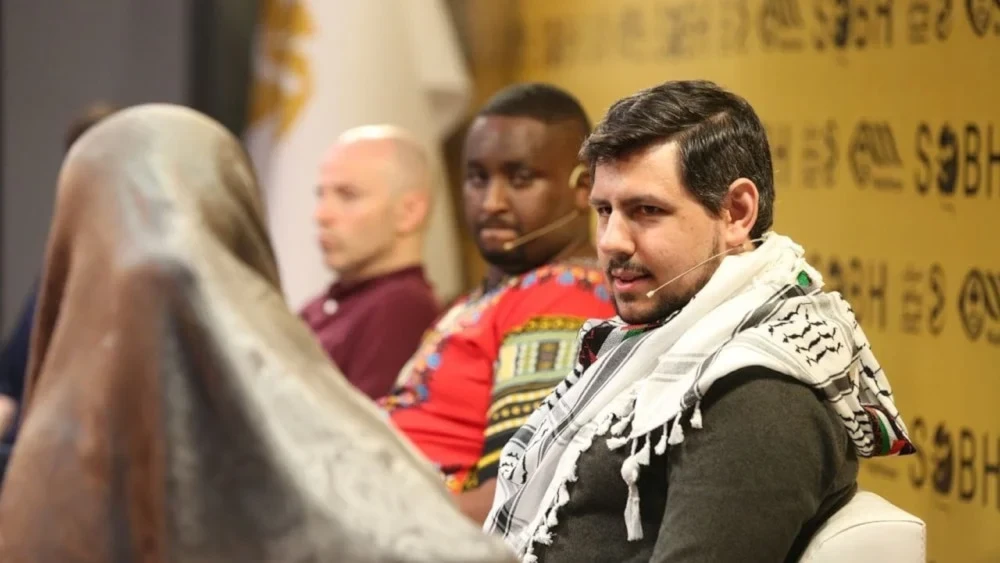Journalist Richard Medhurst detained in Austria after police raid
Medhurst, known for his critical reporting on the Israeli genocide in Gaza, insists UK pressure led to his arrest, calling it state violence and a direct attack on journalism, free speech, and democracy.
-

British journalist, Richard Medhurst, at the Sobh Media Festival, on May 21, 2024. (Sobh Media Festival)
Journalist Richard Medhurst, known for his critical reporting on the Israeli genocide in Gaza, was detained by Austrian authorities this week following a raid on his home and studio.
Police seized all his electronic devices and accused him of being "a member of Hamas" and encouraging "terrorism"—charges that carry a potential sentence of up to over 10 years in prison.
Medhurst described the raid as a "trap", stating that he was threatened with his residency being revoked after a brief interrogation. "They seized my phone and ransacked my place, turning my studio upside down," he said, adding that authorities photographed his belongings and seized years' worth of journalistic tools.
I was detained this week by the Austrian police and intelligence services.
— Richard Medhurst (@richimedhurst) February 6, 2025
They raided my house, office, and took all my devices.
They are accusing me of being a member of Hamas and threatened me with 10 years in prison.
Journalism is not a crime. pic.twitter.com/gztm4bmLuY
He linked his detention to pressure from the UK, emphasizing British involvement in the decision to have him arrested.
"This is state violence and an attack on the entire profession, freedom of speech, and democracy," Medhurst stressed.
He warned that the charges against him could now lead to a 15-year prison sentence and the loss of his residency.
Not an isolated incident
Richard Medhurst was detained at London’s Heathrow Airport on August 15, facing charges under Section 12 of the UK’s Terrorism Act of 2000. He was held at a police station for over 24 hours, where officers accused him of "allegedly expressing an opinion or belief that is supportive of a prescribed organization."
Describing his ordeal, Medhurst detailed that he was removed from the plane by six officers, with five of them in plain clothes and one in tactical gear. "They called me by name and told me to come to the front of the plane … Then they marched me off," he told Anadolu in a video interview.
"They took me to a room on the side, and then they told me that I was being arrested under Section 12 of the Terrorism Act of 2000 … I said I wanted to contact my family, but they told me I was not allowed to. They made it very clear I’m not allowed to speak to anyone."
Read next: Twenty UK arms sellers warned of complicity in Israeli war crimes
He said he was then subjected to a search and handcuffed, explaining that "It was like they were treating me like a serial killer or something, which is crazy."
At the time, Medhurst was taken to a police station and left waiting for about 13 hours before being questioned by two detectives. According to him, the officers refused to provide him with a change of clothes, and he also had to ask for water several times before being handed "a small glass, maybe after several hours."
"They’re recording you in the cell the whole time, both audio and video. Even when you sleep, when you go to the toilet, you’re being recorded," said the journalist.
‘Losing our rights in the West’
Although he was never given a clear reason for his arrest, Medhurst is confident that it is related to his reporting on "Israel's" aggression against Palestinians and the UK's complicity in those actions.
"I’m not at liberty to say what they asked me, but the reason that they arrested me and the reason they’re targeting me, as far as I can gather, is because of my reporting on Palestine," he said, adding that the British government is "angry at my work."
"Basically, what I’m trying to do as a journalist is just provide a counterweight to mainstream media, because the media that we have in England and in the West, it’s just 100% pro-Israel and they’re just lying … I don’t feel that the media tell the truth, so I tried to fix that myself by telling the truth."
He warned that his arrest sets a troubling precedent that could be used to target others.
"They’re trying to make an example out of me. They’re trying to make this acceptable and then use this against other people," he asserted.
"I’m afraid that it won’t stop here. I feel that they will continue doing this and, as we see this genocide in Gaza continuing, we’re also losing our rights in the West at the same time."
These incidents mark a sharp escalation against journalists covering the situation in Palestine, raising concerns about press freedom and political persecution.

 4 Min Read
4 Min Read








